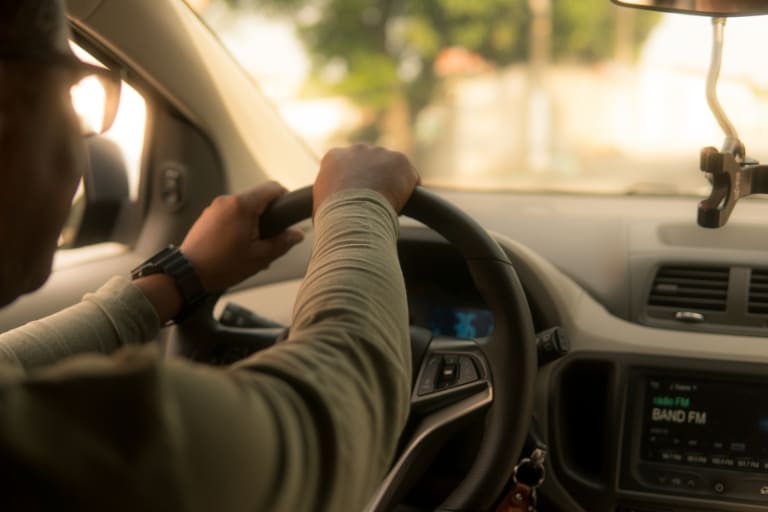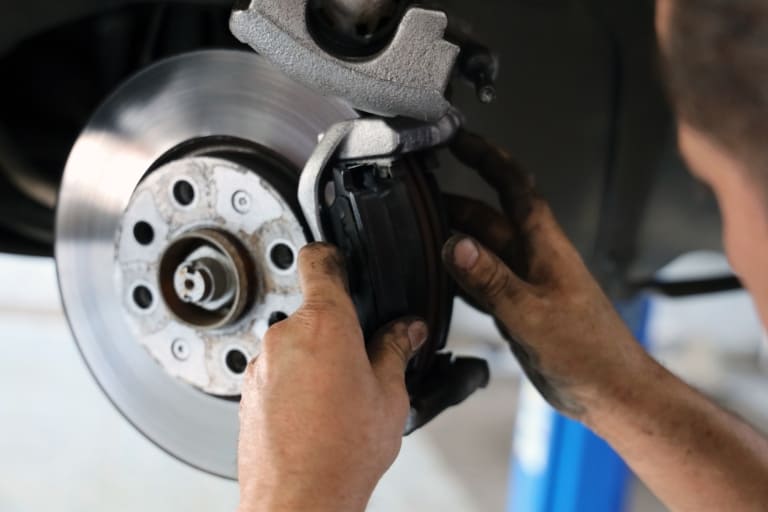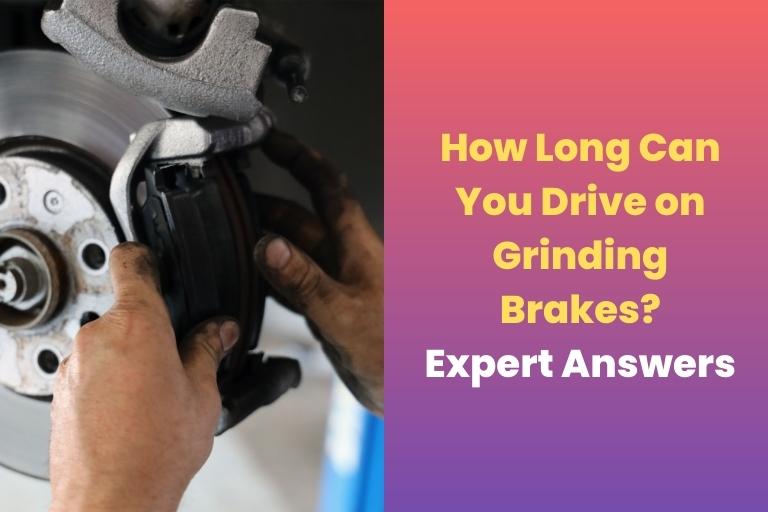Have you ever heard a grinding noise when braking while driving? It’s not a nice sound and might suggest a brake problem. It’s understandable to question how long you can drive with grinding brakes before they become a safety problem.
The solution, however, is more complicated than you would think. Driving with grinding brakes may cause more damage to your braking system, and the longer you wait to get it serviced, the more expensive it may become. This article will go through the symptoms of grinding brakes, as well as what causes them and how long you can drive on them before they become problematic. So, let’s get this party started!
Contents
- 1 How long can you drive on grinding brakes?
- 2 What does cause grinding brakes?
- 3 What happens if you drive with bad brakes for too long?
- 4 How Do I Know If the Brakes are grinding?
- 5 How do I stop my brakes from grinding temporarily?
- 6 How often should I get my brakes checked?
- 7 How long will brakes last when grinding?
- 8 Conclusion
How long can you drive on grinding brakes?

The distance that can be covered with grinding brakes depends on a number of factors, including the quality of the brakes, the condition of the road, the speed at which you are traveling, and so on. However, it is estimated that a car with dragging brakes can travel about 1500 miles on average.
What does cause grinding brakes?
Grinding brakes can happen for a variety of reasons. Worn-out brake pads, broken wheel bearings, corroded or deformed brake rotors, low-quality brake pads, a lack of lubrication, and debris caught in the brake caliper are some the most prevalent reasons. These causes are explained briefly below:
Worn-out Brake Pads
Rotors are used to slow or stop a vehicle. Brake pads can wear out over time, resulting in metal-on-metal contact between the pads and the rotors. When you use the brakes, this contact makes a grinding noise.
Damaged Brake Rotors
Brake rotors are the flat, glossy discs behind the wheels against which the brake pads push to slow or stop the vehicle. Brake rotors, like brake pads, can wear out and acquire grooves or scoring, generating a grinding noise when the brakes are used.
Driving habits
Driving behaviors might also lead to brake grinding. Riding the brakes, severe braking often, or overheating the brakes will hasten brake pad and rotor wear, resulting in grinding noises.
Corrosion and rust
When your car is stored for an extended time, the rotors can accumulate rust and debris. The rust is usually just on the surface and will wear off as the car travels, but it might create strange noises before it does. If feasible, drive your car sometimes to prevent this from happening.
Contaminated Brake System
Dirt, dust, and debris can collect on the brake pads or rotors, contaminating them. This pollution can limit braking system performance and cause a grinding noise.
Low-Quality Brake Components
Low-quality brake components, such as brake pads and rotors, can wear out more quickly than their high-quality counterparts. As a result, they are more prone to generate a grinding noise when they wear down.
What happens if you drive with bad brakes for too long?

Driving with faulty brakes for an extended period of time can result in various safety issues, including:
Increased Stopping Distance
As the brake pads wear out or the braking system deteriorates, slowing or stopping the vehicle becomes more difficult, resulting in a longer stopping distance. This can result in accidents, particularly in emergencies.
Brake Failure
Driving on faulty brakes for an extended period of time can cause the braking system to fail altogether, resulting in a complete lack of stopping force. This serious safety risk can result in catastrophic accidents and injuries.
Damage to Other Brake Components
If worn-out brake pads or broken rotors are not replaced, they can cause further damage to other braking components, such as calipers, drums, and brake lines. This can lead to more expensive repairs and perhaps hazardous driving conditions.
Uneven Tire Wear
Uneven tire wear can be caused by faulty brakes, resulting in tire replacement and increased costs.
How Do I Know If the Brakes are grinding?
If your brakes are grinding, you’ll likely hear a loud, metallic grinding or scraping noise when applying the brakes. This noise can be especially noticeable when driving at lower speeds or braking hard. Grinding brakes can also cause other symptoms, including:
- Reduced Braking Performance: Grinding brakes can limit braking system efficacy, making it more difficult to slow or stop the vehicle.
- Vibrations: When you press the brakes, you may sense vibrations or pulsations in the brake pedal or steering wheel. This indicates that the braking rotors have been deformed or damaged.
- Warning Lights: Some vehicles include a brake warning light that glows on the dashboard if there is a problem with the braking system. If you see this light, you should get your brakes checked as soon as possible.
- Unusual Smells: If you notice a burning or chemical stench when driving or applying the brakes, this might indicate that the braking system is overheating or that the brake pads are worn out.
How do I stop my brakes from grinding temporarily?
It is not advisable to temporarily cease brake grinding since it might indicate a significant problem with your vehicle’s braking system. Grinding brakes can signal worn brake pads, broken rotors or drums, or other braking system issues that could jeopardize your driving safety.
If your brakes are grinding, you should have your car evaluated by a competent technician as soon as possible. Driving with grinding brakes might further damage your vehicle’s braking system and make driving hazardous.
Meanwhile, you can lessen the grinding sounds by softly applying the brakes and avoiding severe braking. This may temporarily alleviate the pressure on the brake pads and reduce the grinding sounds. Keep in mind, however, that this is simply a temporary remedy, and you should get your brakes tested and serviced as soon as possible.
Related Article: How Close Should Brake Pads Be To Rotors?
How often should I get my brakes checked?
You should have your brakes examined at least once a year or more frequently if you see any indicators of brake wear or issues like squeaking, grinding, or decreased stopping power.
Furthermore, if you drive in difficult conditions, such as stop-and-go traffic or steep terrain, you may need to get your brakes tested more regularly.
Regular brake checks help discover and treat problems before they become more serious and expensive to fix, and they can also guarantee that your brakes are operating correctly to keep you safe on the road.
Also, Check: Brake Shuddering After New Rotors and Pads
How long will brakes last when grinding?
It is impossible to predict how long brakes will last while grinding because it depends on the intensity and source of the grinding. However, driving with grinding brakes can cause significant damage to the braking system and even full brake failure.
To guarantee the safety of yourself and others on the road, address grinding brakes immediately and have them inspected and serviced by a skilled technician.
Related Articles:
- Does the Emergency Brake Lock All Wheels?
- Can You Use Front Brake Pads on The Rear?
- Why Does My Car Shake After Changing the Brake Pads?
- How to Install Anti-Rattle Clips on Brake Pads
- How Long Can You Drive Without Brake Pads?
- How Long Do Brake Pads Last
- Fixing New Ceramic Brake Pads Making a Grinding Noise
- Ceramic vs. Semi-Metallic Brake Pads: Which is Better?
- Why Are My Brakes Grinding After New Pads And Rotors
- Ceramic vs OEM brake pads
- Ceramic vs Organic Brake Pads
- Ceramic vs Carbon Fiber Brake Pads
Conclusion
Maintaining your brakes is critical for safe driving. Regular brake checks help spot problems before they become serious, ensuring your brakes are in good operating order. Grinding brakes should always be addressed or temporarily repaired since this might cause more damage and jeopardize your driving safety.
Thus, it is essential that you inspect your vehicle on a frequent basis in order to avoid any potentially harmful circumstances on the road. If you see any indications that you believe require immediate attention, it is always best to consult with a suitably educated specialist. You can keep your car safe to drive and avoid any problems by keeping your brakes in good working order and correcting any flaws as soon as possible.
